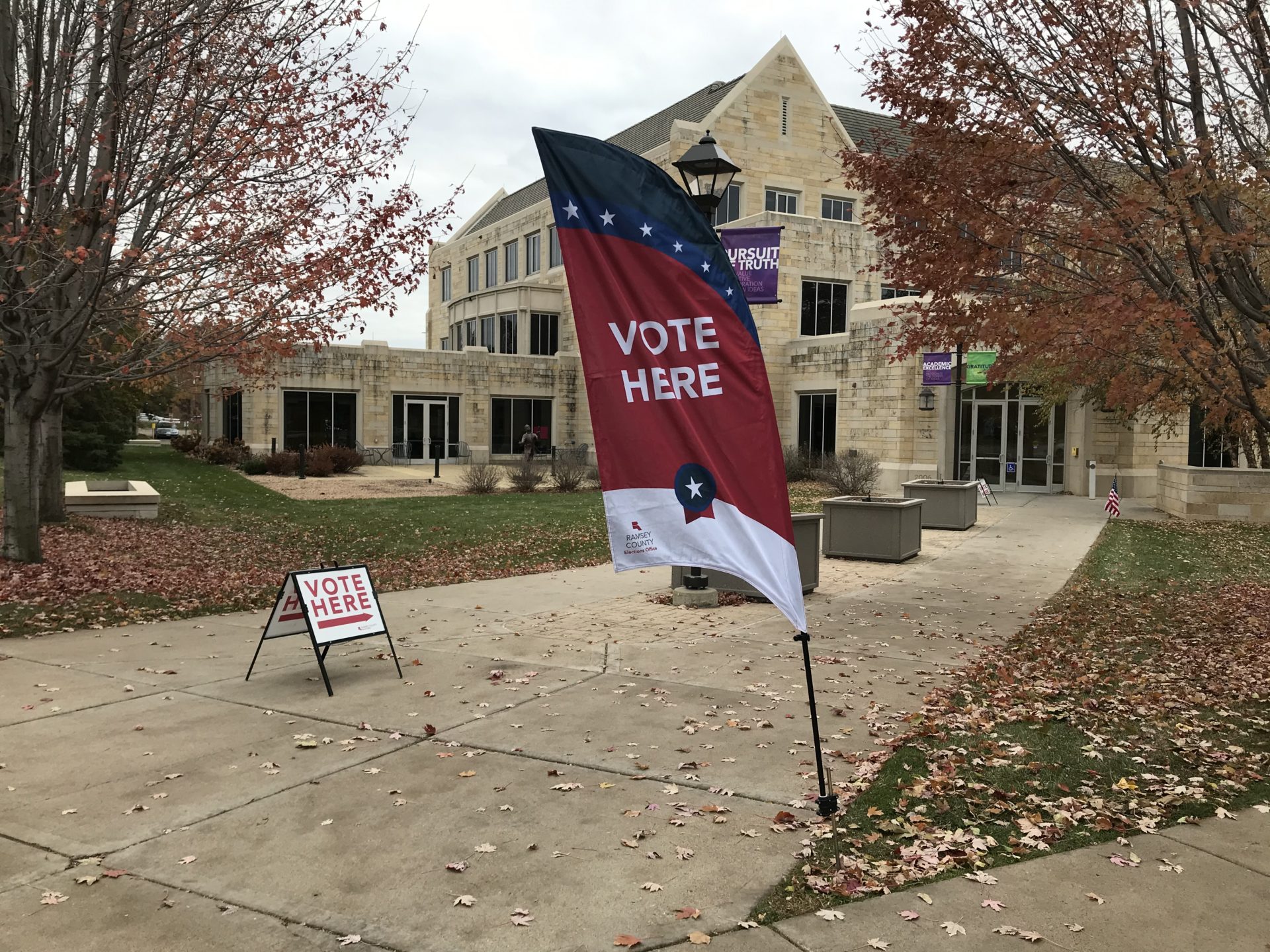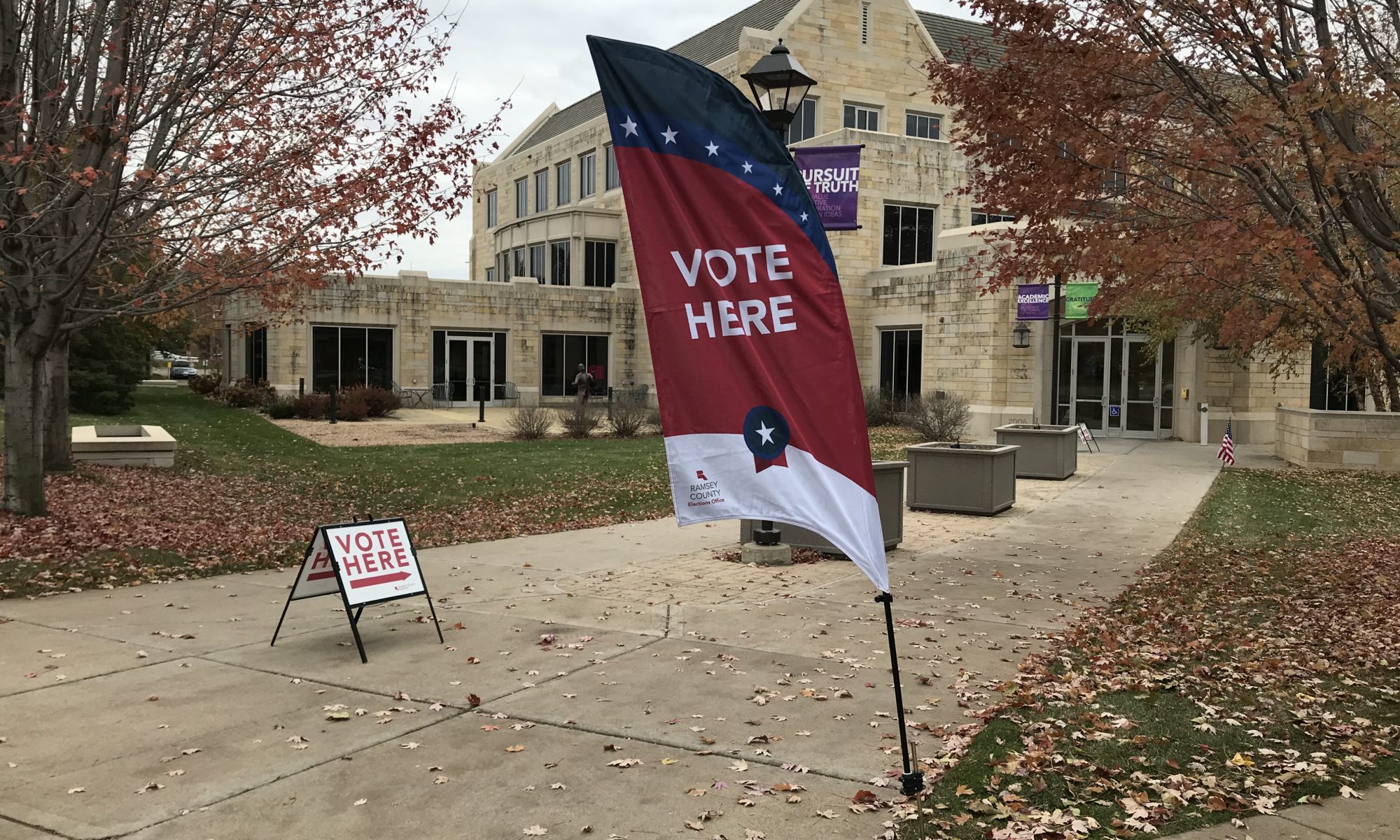
A Nov. 5, 2019 photo of McNeely Hall as a polling place. Many St. Thomas students have chosen to vote by mail instead of voting in person due to the COVID-19 pandemic. (TommieMedia file photo)
Many St. Thomas students have chosen to vote by mail instead of voting in person due to the COVID-19 pandemic, but for out-of-state students, that has always been the only option.
Every state offers an absentee ballot that is available to students who are registered to vote, but rules vary from state to state, something School of Social Work Director Katharine Hill said students could struggle with.
“Some states require a witness on an absentee ballot— you have to have another registered voter sign— and some don’t,” Hill said. “Some states accept absentee ballots that are postmarked by the election, and some have to be received by the election.”
St. Thomas senior and Iowa resident Max Techau has voted by mail-in ballot in the 2018 and 2020 elections and discovered that the process wasn’t difficult, just confusing.
“There’s a lot of little things on the ballot that you have to make sure you’re doing right,” Techau said. “I feel like if someone was just skimming it they might miss some of those instructions and they could get their ballot thrown out.”
St. Thomas senior and Illinois resident Jade Whaley said she was also confused by the directions of the mail in ballot.
“It wasn’t as straightforward as I expected it to be because there was a lot to it,” Whaley said.
Former St. Thomas student Graham Collings said he has chosen to vote in person because of the unknowns of absentee voting.
“I would say most people didn’t know what absentee ballots were, other than military people. I don’t know much about it,” Collings said.
Techau noted that he wasn’t informed on how absentee voting worked in high school and had to get help from his parents.
“I definitely didn’t learn about it from high school,” Techau said. “I don’t think we talked about how to do it even though my senior year was an election year.”
A survey by the Center for Information & Research on Civic Learning and Engagement (CIRCLE) on 18 to 29 year olds found that 64% of high school students had been encouraged to vote and 50% were taught how to register to vote. Hill said students should have learned more about absentee voting before the age of 18.
“I don’t think we prepare people well for it,” Hill said. “I think it’s a failure of our civics education.”
Hill said making students track their ability to vote when they already experience so much change is an ‘unnecessary complication.’
“If you look at when people vote for the first time and when people leave for college, those are often at the same time, and that makes it more complicated for college students because it’s sort of at a point when there’s a lot of change already,” Hill said.
Collings said the worry for students seems avoidable.
“(Voting) is worrying a lot of people which, when you think about it, is an unnecessary worry when it comes to our rights,” Collings said. “It’s just hard that a lot of people can only really rely solely on these absentee ballots.”
According to the U.S. Elections Project, 91 million absentee ballots have been requested, causing many to try to learn about this system and ask how reliable it is.
Even though many trust mail-in voting, Collings wants to make sure his vote counts.
“If I’m going to get my vote in, I’d rather it be in a classroom way or just going in and doing it,” Collings said. “I’m not going to mess with having my opinion accounted for, especially in this election.”
President Donald Trump tweeted that mail-in voting is “a formula for RIGGING an Election.” Despite these worries brought by the president, Hill pointed to the fact that absentee voting has been around for years and has not seen many issues.
“There are multiple states in the United States that every ballot is an absentee ballot,” Hill said in reference to states such as Utah, Washington and Oregon. “The US military has been (voting by mail) since the 1950s. It has been shown to be a very safe and reliable way of voting.”
According to the Brennan Center for Justice, Oregon, who has been voting by mail since 1987, has sent out over 100 million ballots since 2000 and has only documented about a dozen cases of proven fraud. The center also found that between 2000 and 2012, there have only been 491 cases of absentee ballot fraud in the U.S.
Techau said as long as there are trustworthy people in charge, mail-in voting is very reliable and a great way for out-of-state students to vote.
Hill even said there are some advantages to absentee voting.
“If you are voting absentee, you are voting from home, and you can look up the information on your ballot,” Hill said. “You can look up information about candidates or other issues, and that can be really helpful.”
Though there are strengths in our voting system, Hill believes there are unneeded complications that can be fixed.
“I think we can move to a system of national voter registration where it becomes an opt-out instead of an opt-in so that everybody, when they turn 18, is automatically opted into being registered to vote at a national level,” Hill said. “I think we could also move to a system where people are automatically sent their ballots.”
Despite wanting change, Hill encourages people to vote in the current system and ask questions.
“I think sometimes, particularly younger people especially when it’s their first election, feel like somehow they’re supposed to know this stuff. That there’s a sense of like, ‘Oh I should know how to do this and I’m embarrassed that I don’t know how,’” Hill said. “Asking for help and asking for clarification on sort of ‘how do I do this’ is completely normal and appropriate and the right thing to do.”
Scout Mason can be reached at maso7275@stthomas.edu.

